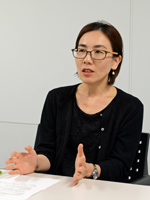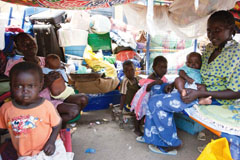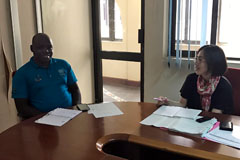InterviewJICA-RI Focus Vol. 40 - Interview with Research Fellow Chigumi Kawaguchi
2017.09.01
The JICA-RI research project "Comparative Study of Humanitarian Crisis Management from the Perspective of Bilateral Cooperation Agencies” has entered its final phase. The project identifies the systems and approaches needed for aid agencies to provide seamless support in humanitarian crises. In addition to researching this project, Research Fellow Chigumi Kawaguchi launched a new research project in April 2017, titled "Conflict and Gender-based Violence: The Role of Aid in Victims’ Help-seeking and the Recovery Process." We asked her about the role Japan should play in peace-building.

■ Profile
Program Officer, International Peace Cooperation Office, Cabinet Office; Research Assistant, Graduate School of Security Studies, National Defense Academy; Researcher, International Peace Cooperation Division, Ministry of Foreign Affairs; current position since 2014. Main fields of research: Comparative Politics, Security Studies, International Organization Studies, Peacebuilding, Conflict Prevention.
- What do you think about the current trends in peace-building in Japan and around the world?
Since the end of the Cold War, conflicts threatening international peace and security have shifted from conflicts between nations to domestic conflicts, and there are demands for the United Nations to strengthen its ability to respond to domestic conflicts. Japan has contributed to the development and economic growth of developing countries, mainly in Asia, through ODA. However, Japan has little experience in post-conflict peace-building when stability has been achieved by a peace agreement after the conflict. In 1992, the United Nations Transitional Authority in Cambodia (UNTAC) was established as a peacekeeping operation (PKO). Passing of the International Peace Cooperation Act (Act on Cooperation with United Nations Peacekeeping Operations and Other Operations) and deployment of the Self-Defense Force have garnered significant attention. However, rebuilding a country after conflict requires diverse assistance, including election support, establishing rule of law, reconstruction of infrastructure, restarting education, creating employment and reconciliation. Peace-building can be achieved with a combination of support for political, social, economic and other aspects, rather than support only for security. Election monitors, police officers and other civilians were also dispatched under the International Peace Cooperation Act, but there was not much discussion on the Japanese way of peace-building, whereby it utilizes its postwar experiences and experience of ODA.
After Sadako Ogata was appointed as the President of JICA in 2003, JICA began taking a more proactive approach to peace-building. As JICA is a development assistance organization, its main focus has been on preventing recurrence of conflict through support at the recovery, reconstruction and development phases, which come after the emergency phase of the post-conflict. Recently, however, there has been a demand for more comprehensive and continuous support before, not after, the end of conflict in order to realize the goal of "sustaining peace." The term "sustaining peace" emerged from the 2015 review of the UN’s peacebuilding architecture. My opinion regarding this issue is that we should take a comprehensive approach to support sustainable peace through an organic combination of activity areas, including politics, security, development, humanitarian and human rights. The cooperation of a wide variety of actors related to peace-building is crucial for a comprehensive approach. How can Japan contribute to peace in the context of such worldwide trends? That is my main interest as I conduct my research.
- How did you become interested in peace-building?
It was the Gulf War when I was in junior high school. I thought the world had achieved peace after the end of the Cold War, and I believed Japan would not engage in war. However, I learned there was war in the world and Japan could support the use of force under the United Nations Security Council resolution. I was deeply shocked as I watched the UN Security Council day after day on television, debating and deciding the use of force. I was also shocked Japan did not receive the appreciation from international society despite the enormous amount (over one trillion yen) of contribution. That sparked my desire to learn more about the United Nations and peace, and become involved in Japan’s contributions to peace.
It was a significant challenge for me to research the link between humanitarian and developmental aid at JICA-RI because I had researched peace-building from the perspectives of politics and security. However, conducting research through discussion with colleagues with different research backgrounds has allowed me to grow as a researcher. Peace-building is required in areas where security is unstable and governance is fragile, so it is very difficult to carry out projects. That is why research in this area has an important role to play. When thinking about the link between humanitarian aid and developmental aid and the need for a comprehensive approach to peace-building, the role JICA can play as a development assistance organization is not small by any means. For that reason as well, I hope we can examine the roles of Japan and JICA in peace-building and the JICA-RI can take the initiative in new peace-building research.
- Can you give us an overview of the Comparative Study of Humanitarian Crisis Management from the Perspective of Bilateral Cooperation Agencies?
This study addressed six cases of humanitarian crises caused by natural disasters and conflict (Timor-Leste conflict, South Sudan conflict, Syrian crisis, Hurricane Mitch, Indian Ocean Earthquake and Tsunami and Typhoon Yolanda) to examine the short-term humanitarian aid and long-term developmental aid activities conducted by bilateral aid organizations like JICA, and to identify the lessons that were learned. Research Fellow Oscar Gomez and I wrote a working paper on the background and framework of our joint research, and worked with outside researchers to analyze the activities of donors and bilateral aid organizations such as the United States, Australia, the EU and Japan (JICA). Gomez took the lead for disaster-related work and I took the lead for conflict-related matters. I was also responsible for the case study of South Sudan.

Internally displaced persons in South Sudan (Photo: JICA/Shinichi Kuno)
Although there have been studies of the activities focusing on the link between humanitarian aid and developmental aid by international organizations and UN agencies, the activities by bilateral donors and bilateral aid organizations have not necessarily been researched sufficiently. Through these six case studies, we found that donors and bilateral aid organizations have taken a variety of approaches when paying attention to the link between humanitarian aid and developmental aid in humanitarian crises. However, we also found that strategy for crisis management, methods of coordination between actors, funding categories and other systems, as well as the motivation and political intentions of activities differ according to the donor. This feature sometimes encourages the linkage between humanitarian aid and developmental aid, and sometimes hinders it. It also became clear there were differences among aid providers from the international community, local governments and local disaster victims regarding the timing and contents of demands for a link between humanitarian and developmental aid. At the UN World Humanitarian Summit in May 2016, we distributed a pamphlet with five messages gleaned from these case studies, and a research paper. We also presented them at conferences in Japan and overseas. We are currently compiling the overall findings of the research in an English-language book and plan to publish it this fiscal year.
- Can you give us an overview of your new research project "Conflict and Gender-based Violence"?
"Conflict and Gender-based Violence: The Role of Aid in Victims’ Help-seeking and the Recovery Process” is the research project I launched in April 2017, addressing gender-based violence (GBV) in times of conflict. In the past, my research has tended to focus on peace-building by international organizations and bilateral donors, but this time the research will focus on the people who suffer during the process of shifting from conflict to peace.
Resolution 1325 on women, peace and security (WPS), which was adopted by the UN Security Council in 2000, addresses the unfairly high impact of conflict on women and girls in particular, and indicates the need for special measures to protect women and girls from all forms of violence, including GBV. Each country has created individual action plans and is working to solve the problems indicated in the resolution, but Japan lagged behind a bit, finally formulating a plan in September 2015.
Even when not in the midst of conflict, GBV is a difficult problem to address, and has only recently been examined in Japan’s peace-building research. In the past, I have addressed the problem of GBV under the impact of conflict as author and editor of publications about comprehensive approaches to peace-building, but since then it has not developed very much as a new research field in Japan. It was a good opportunity for me to launch the project while I belong to JICA, which includes peace-building and gender into its mainstream projects. It would be wonderful if the research findings could be used for Japan’s WPS policies and measures or for JICA’s programs and projects.
- What is the specific focus of your research?
My particular focus in this research is on the South Sudanese refugees who flowed into northern Uganda in large numbers due to the South Sudanese Civil War that began in December 2013 and reignited in July 2016. The book "Comparative Study of Humanitarian Crisis Management from the Perspective of Bilateral Cooperation Agencies", of which I am one of the editors, addressed this issue. However, the humanitarian crisis caused by the South Sudanese Civil War has proven difficult to resolve, despite the efforts by the international society over many years. Of the many humanitarian problems, protection from GBV has become a pressing issue, and various aid organizations have begun investigations and other efforts.
GBV victims account for more than half of children of refugees, and for 20% of refugee adult women . Looking only at the number of reported victims, it is only about 1% of the total refugee population, but it is believed incidents have been overwhelmingly underreported. Accordingly, I want to focus on victims’ help-seeking behavior. Although international NGOs, the Office of the United Nations High Commissioner for Refugees (UNHCR) and other aid organizations who handle GBV victims intervene in refugee settlements, there are still many victims who cannot seek help. Why are they unable to ask someone for help or receive necessary medical and psychological assistance, despite being harmed? The key will be how far the investigation can reveal those hidden reasons. This certainly does not mean I can deal with this problem because I am a woman, but there are cases when female researcher is favorable when conducting interviews and gathering information. In this way, my female perspective might be useful for our project. However, we should note that the victims of GBV include not only women and girls, but men and boys as well. That is an even more unexplored issue. I am not sure how far I can go with this research, but it is important to speak up if I discover something in the investigation; I hope to enlist the cooperation of male researchers as well. JICA’s work is no longer unrelated to humanitarian crises, so I would like to find out hints for JICA’s future projects on refugees and peacebuilding from the conflict and gender project.
- What is your specific method of investigation, and what is your future plan?
I plan to conduct the initial visit to Uganda in August 2017, then a full-scale investigation from November 2017 through March 2018. I intend to conduct interviews and focus group discussions in a number of refugee settlements in the North Uganda. In this field research, I will not ask about harm from GBV itself, but instead I will ask what they think about women’s rights and violence against women, what countermeasures they know of, to whom they would tell if they became victims, what kind of assistance they would want, etc., in order to identify the paths for seeking help and the inhibiting factors. GBV victims in general face issues such as being unable to tell anyone, or being able to tell family and close friends but nobody else, not knowing what assistance is available or having a difficulty to access and cases in which there are problems on providing side. Although circumstances under the influence of conflict are not the same as in ordinary times, I hope to reveal how research on the help-seeking behavior of GBV victims in ordinary times can be applied and the unique circumstances during conflict. I plan to publish the results of the investigation as JICA Research Institute working papers and academic papers.

Research Fellow Chigumi Kawaguchi (right) conducted an interview research in Uganda
This research is challenging compared to ordinary research, such as the impact of conflict, refugees and GBV, and we face various difficulties every day. However, it is important to have an attitude of pioneering new research while overcoming these difficulties. Peace-building involves not only rebuilding a nation, but also the physical and psychological recovery of people who have been hurt. I expect that research on people-focused peace-building will spread in Japan as well.

事業事前評価表(地球規模課題対応国際科学技術協力(SATREPS)).国際協力機構 地球環境部 . 防災第一チーム. 1.案件名.国 名: フィリピン共和国.

事業事前評価表(地球規模課題対応国際科学技術協力(SATREPS)).国際協力機構 地球環境部 . 防災第一チーム. 1.案件名.国 名: フィリピン共和国.

事業事前評価表(地球規模課題対応国際科学技術協力(SATREPS)).国際協力機構 地球環境部 . 防災第一チーム. 1.案件名.国 名: フィリピン共和国.

事業事前評価表(地球規模課題対応国際科学技術協力(SATREPS)).国際協力機構 地球環境部 . 防災第一チーム. 1.案件名.国 名: フィリピン共和国.

事業事前評価表(地球規模課題対応国際科学技術協力(SATREPS)).国際協力機構 地球環境部 . 防災第一チーム. 1.案件名.国 名: フィリピン共和国.
scroll